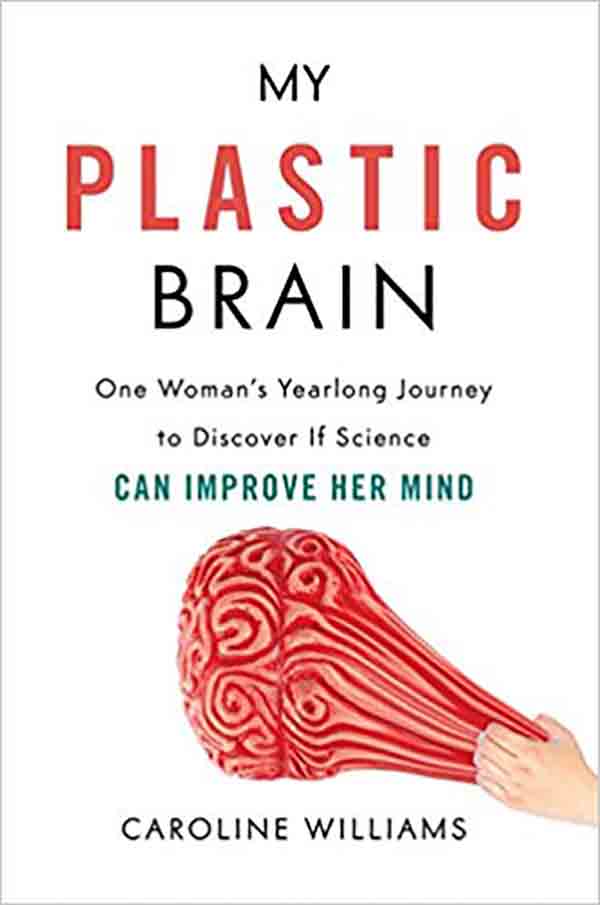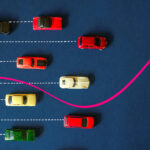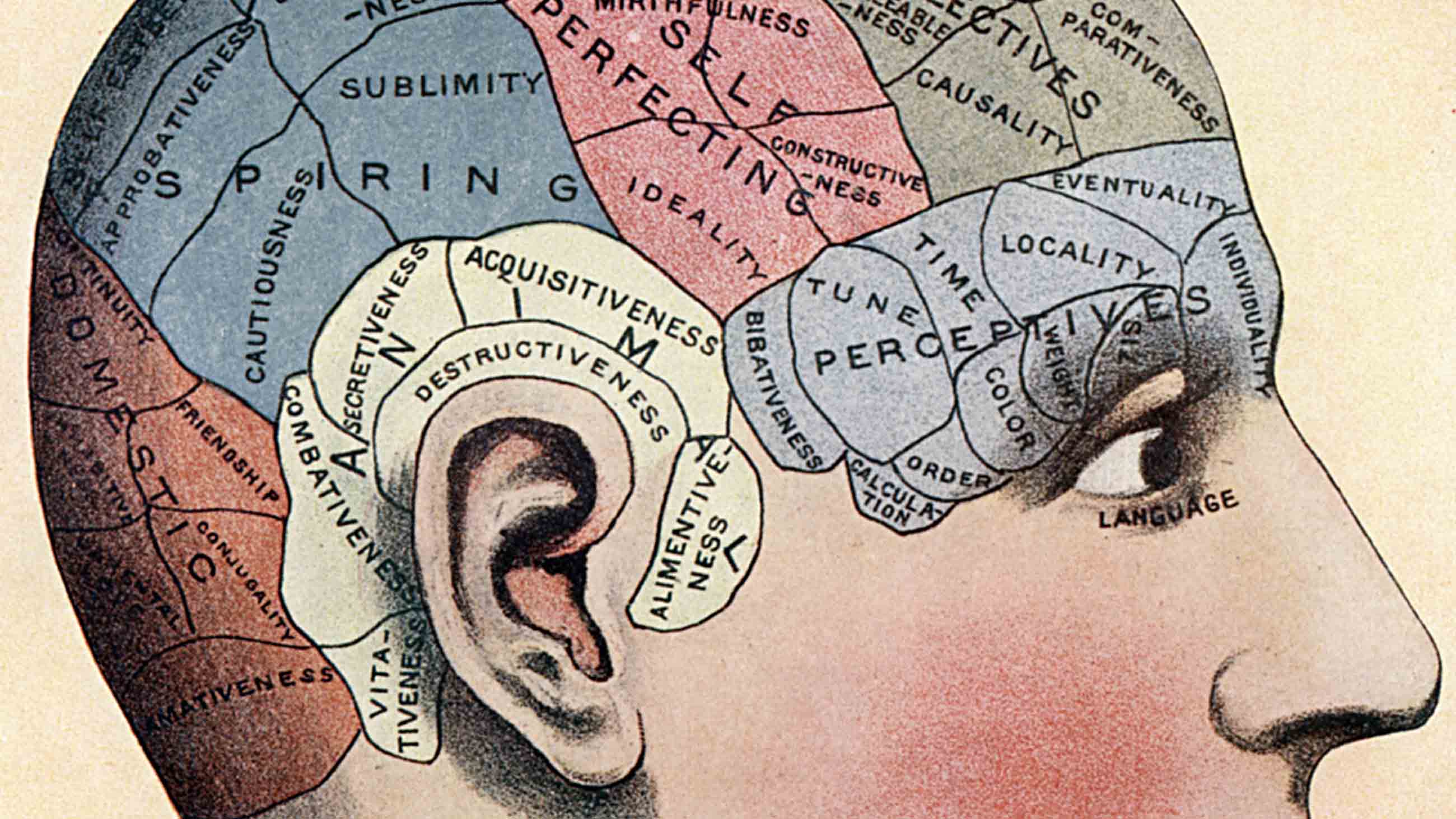I‘m not the kind of girl who jumps into a strange man’s car and hopes for the best. Especially when a quick Google stalk reveals him to be recovering from an addiction to methamphetamine. But having been assured by someone I trust that he was “one of the good guys,” I accepted his offer of a ride to the airport and … hoped for the best.

WHAT I LEFT OUT is a recurring feature in which book authors are invited to share anecdotes and narratives that, for whatever reason, did not make it into their final manuscripts. In this installment, Caroline Williams shares a story that was left out of “My Plastic Brain: One Woman’s Yearlong Journey to Discover if Science Can Improve Her Mind,” published by Prometheus Books.
In hindsight I’m glad I did. After many months talking to scientists about brain change, it was this journey that prompted me to think more deeply about what that actually meant.
I was in Lawrence, Kansas, researching a book that I hoped would apply the latest science to make real, measurable, and lasting changes to my brain. I wanted to learn, among other things, how to concentrate better and to overcome my irrational anxieties about life. I was in Kansas to try to boost my powers of creativity.
I had begun my journey several months earlier, after becoming frustrated with the quality of advice available in the self-help section of the bookstore. They all made it sound so easy: Draw a line in the sand, change the way you think, and hey presto, you can become a different person. Surely it can’t be that easy, I thought. Some things are so deeply embedded into the wiring of the brain that you can’t unravel them just because you feel like it.
Yet here was a walking, talking advertisement for DIY brain change. As we journeyed across the plains he told me about his early life — a chaotic childhood in foster care, anger issues, failed relationships, and a spiral into addiction. The future did not look good. Then, in his 40s, he decided to change his life. A couple at his church offered to “re-parent” him, providing the kind of stability and unconditional love he never had as a child. He put them through hell, he told me, but they refused to give up. Now he’s been sober for more than a decade, has reconciled with family, and is happy in his own skin for the first time — proof, he told me, that anyone can change their brain.
It was a powerful story, and it made me rethink my assumptions about the power of the mind. It was a subject that had made me uncomfortable, bordering on dismissive because for every person with an inspirational tale, there are many more struggling to live with mental ill health, addiction, or the aftereffects of trauma. To invoke the power of the mind as a cure-all felt like an insult to people battling just to get through the day. It felt like accusing them all of doing it wrong — as if they were weak, lazy, or too stubborn to ask loved ones for help.
I also know from experience that when it comes to the brain, understanding the problem is only half the battle. Knowing that your emotional reaction to a situation isn’t rational or helpful doesn’t necessarily make that feeling go away. And when depression closes in, no amount of happy thoughts will make it lift.
On the other hand, it is well documented that the mind is incredibly powerful. Take the placebo effect. In clinical trials for new medicines, a sugar pill can reduce pain as much as an actual analgesic. In some studies, a placebo has been found to work even when a patient is told the pill contains no medicine. Since there is no active drug in the treatment, the improvements can only come from patients’ own minds. They are, somehow, literally thinking themselves better.
The placebo effect may also work in subtler ways. In one experiment, people were asked how much they expected a session of brain training to improve their cognitive skills. Afterward, the changes in their scores almost exactly matched the improvements they expected to make, as if they had subconsciously willed themselves to do better. On the flip side, it also meant that if people had no confidence that they would improve, they didn’t.
Then there is the nocebo effect, the dark side of placebo — in which believing something is going to harm you can make you physically ill. People in clinical trials who are warned about possible side effects from a drug often suffer them, even when they are given a placebo rather than the active drug. In experiments, volunteers who were asked to inhale a harmless gas, then told it might make them sick, suffered physical side effects such as nausea and headaches. There have even been reports of people dying of what they have been told is terminal cancer, only for an autopsy to show that they had been misdiagnosed.
This all seems to back up the self-help mantra that thinking positive is the way to happiness, and negativity only brings bad things your way. But it turns out not to be quite that simple. In one psychology study, researchers set out to test the idea — so often touted by self-help gurus — that repeating positive affirmations makes people feel better about themselves. They asked a group of people to repeat the phrase “I am a lovable person” 16 times. While it had a marginally positive effect on people with high levels of self-esteem, for those with low self-esteem it backfired completely, making them feel even worse about themselves afterward.
The explanation is that according to a psychological theory called “latitudes of acceptance,” messages that are close to our own opinions are more believable than those that contradict us. When we come up against something that contradicts our beliefs we tend to resist it, hardening our point of view. It’s hardly surprising that constantly telling yourself you are happy, when you feel anything but, makes matters worse.
Using visualizations to picture a future in which you are fitter, happier, and more productive is similarly unhelpful, because it can backfire, making it less likely that you will reach your goals. This may be because seeing success in your mind’s eye, without also visualizing the effort it will take, makes it seem easier to achieve than it really is, robbing you of the motivation you will need to get there. And when you’ve made your goal seem easy and yet still failed, you feel even more of a loser than you did in the first place. Studies suggest that this effect is particularly strong in people who are more prone to rumination — the repetitive negative thinking that is a common feature of depression. In short, people who already feel bad about themselves are the last people who should be trying to think positive.
So what to do if you have low opinion of yourself, yet want to escape the clutches of the nocebo effect?
One option is to use negative thoughts as a source of motivation, to make a change. While people with high self-esteem and buckets of optimism might benefit from thinking happy, positive thoughts, those without it might be better off spending a little time focusing on the worst-case scenario and using that as a way to steel themselves into action. This is known as “defensive pessimism,” and while it may be a recipe for anxiety in the short term, it seems to work. In research dating to the 1980s, Julie Norem of Wellesley College in Massachusetts found that people who used anxiety as a motivator performed better when they were allowed to stew for a while before a challenge. If someone comes along and cheers you up, it interferes with your coping strategy and you do worse work. If you have a presentation to give, visualizing yourself making a fool of yourself in front of a large group of people can provide the motivation to practice until it is flawless.
A potentially healthier way to do something similar is to change your unconscious beliefs so the positive things that you or others tell you start to line up with how you see yourself. This isn’t easy: By definition, unconscious thoughts are ones that you aren’t aware you’re having, which makes them tricky to access and even more difficult to change.
But it is possible. In my Kansas friend’s case, the change seemingly came from his new “parents,” who refused to believe he was a bad person no matter how hard he tried to push them away. Luckily for both parties, the message eventually sank in, until he was finally able to believe it.
Another option makes use of a fairly new branch of science that is showing some promise for depression and anxiety. It is based on the fact that while we tend to assume that we all have the same window on the world, our conscious perceptions are built upon the way our brains unconsciously prioritize what is coming in through our senses.
According to this theory, differences in our perception of the world — whether it is dangerous and foreboding or full of exciting opportunities — comes down to the balance between two of the most ancient circuits in the brain, one responsible for seeking out danger and the other for finding rewards. If your brain is wired to favor one circuit over another, the result is a cognitive bias toward the positive or negative aspects of the world around us. These biases operate at lightning speed and, crucially, outside of our conscious awareness, and they give us a fundamentally skewed version of reality.
Negative cognitive biases have been found to have a hand in depression and anxiety, explaining why many people can’t articulate why they are feeling so awful. It could be that their brains are showing them only the bad stuff and filtering out the good; they literally don’t see the upside of life.
Measuring your own cognitive bias is easy, and takes only a few minutes. The good news, for those who come out with a negative bias, is that there is some evidence that this can be changed through a type of cognitive training designed to force your brain to pick out smiling faces from a crowd. Over time, the theory goes, it becomes an unconscious mental habit that changes the assumptions you don’t even know you are making about yourself and the world around you.
After a year of experimenting on my own brain, and challenging the assumptions I didn’t know I was making, I conceded that it is indeed more powerful than many of us realize. Given the complexities of how our brains work, though, I am even more wary of anyone selling a simple way to free troubled minds from their woes. As one neuroscientist told me, “For better or worse, we are very complex beings.” And that, I would argue, only makes us more interesting.
Caroline Williams is a freelance science writer and editor, and a consultant to New Scientist magazine. She writes for the BBC and has contributed to The Guardian, among other outlets.











Comments are automatically closed one year after article publication. Archived comments are below.
Well, nobody ever thought in his true mind that change comes easy – least to your own brain, and thus yourself. But we also know that, if you cannot change yourself, you certainly will not be able to change anyone else.
I would have liked Caroline to explain what she did, exactly, during the one year she experimented ? Smiling at everybody whom she passed on the street, to feel happy if someone smiled back ?
Also her statement: “MEasuring your own cognitive bias is easy” remains just that, a statement. How so ?
Good article
Meta-cognition and a basic understanding of its uses seems to making a breakthrough.
The biases we all have (+ or -) may only become transparent when we deliberately examine an issue from our opposite biased standpoint.
God Bless you. MetaCognition, Metaphysics…we collectively are still in the Womb.
I thought this article would be a lot more informative. Research on our brains and how it dictates our actions is so advanced. It was disappointing.
As someone who has suffered from TBI, I can enthusiastically say that Caroline Williams is a fantastic, well-informed writer. She is pioneering and destigmatising the complexities of the many types of mental challenges people deal with.
Thank you, Caroline, for showing me new ways to help myself and offer encouragement to other people dealing with similar issues.
I hope you continue to share your findings in upcoming books!
Williams as a freelance journalist performs a significant role. She takes what can be a convoluted subject, digests it partially for us, and gives us a readable form. My most recent readings support my project of a life inventory in preparation of my own death. In the arena of brain research, I found the work regarding projection versus perception helpful. Further, I found that some of what Williams writes has a foundation in the classic Stoic philosophy. These concepts formed well over 2000 years in our past.
Cultivate manic depression and get the best of depressive motivation and positive motivation at different times?
Better off to read Doidge’s two books. In the second he debunks the efficacy of the placebo effect as a short-term effect. It and the nocebo effect are real but of moderate effect. Laying down new neural patterns takes 3 weeks minimum, not as fast as the placebo effect, but then in the second book “The Brain’s way of healing,” we’re talking about heavy duty things like TBI, MS, PD, and chronic pain, not IBS as in the placebo trial linked here. Anxiety and rumination are well covered in a chapter in his earlier book “The brain that changes itself.”
Sounds intriguing and enlightening.
I’m glad the author refuses the “One size fits all” approach so common in the self help noise that is out there today.
I will have to get my hands on this book soon.